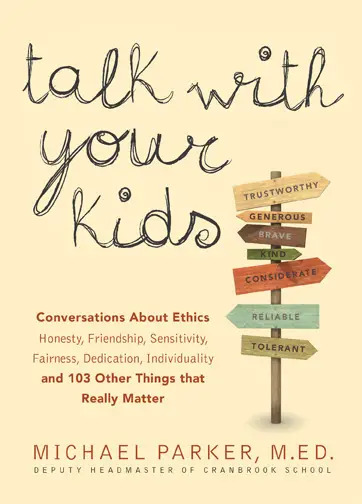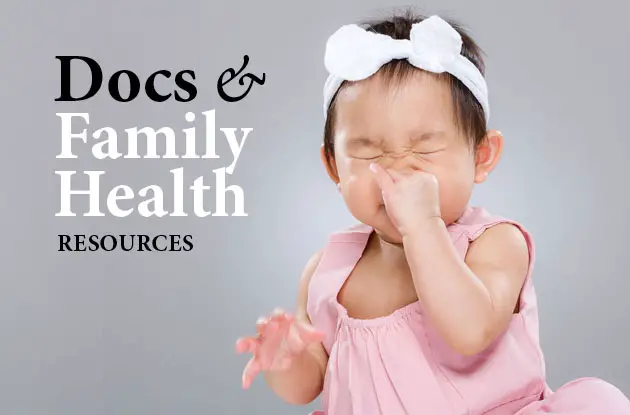Michael Parker, M.Ed., author of Talk With Your Kids: Conversations about Ethics, Honesty, Friendship, Sensitivity, Fairness, Dedication, Individuality and 103 Other Things that Really Matter, shares two conversation starters to help you talk to your kids about substance abuse.
Talk with Your Kids (Black Dog & Leventhal Publishers) is a handbook for having productive, real conversations with your children about values. And while children don’t learn ethics through a book, parents will feel empowered by the variety of concrete tools provided in these pages. Author Michael Parker, M.Ed., offers valuable advice on how parents can “fan the flames” of discussion, including ask follow-up questions, play devil’s advocate, present opposite opinions as alternatives, and demonstrate that you are interested in your kids’ opinions. Some don’ts: Don’t speak too much, don’t disagree too early, and don’t set yourself up as the final answer.
What follows are two conversation starters on the tough topic of drugs and young people. Each takes a very different approach, and each merely scratches the surface—but they definitely get 10- to 15-year-olds thinking…and talking.
Conversation No. 1
Imagine that a new chocolate-soma pill was distributed for free at your school by the Government. If you chew it, the whole world looks like friendly, happy paradise. Everywhere you see fields and rivers of gold. Buildings are palaces made from rare, edible rubies and diamonds. Everyone is delighted and laughing all the time. Everything is fascinating—every blade of grass and every molecule of dust. And the feeling goes for hours. There is no way you can sensibly communicate with other people or do any work, but you don’t care. When the pill wears off there are no side effects. When you go home you find that your parents have been given whole packets of pills too, and you can go back to friendly happy paradise whenever you want. It turns out everyone has received a limitless stock of these pills.
Questions:
- What would happen to your school after a day?
- What would happen to your school after a month?
- What would happen to the country after a week?
- What would happen to the country after a year?
- Would people be able to stop, or would the pills become addictive?
- What is the difference between: a) taking a pill, and b) feeling
happiness because you did well on an assignment or scored the winning goal in a game? - Is the happiness you feel taking the pill real? Why?
- What would happen if everyone at the school used a drug such as
marijuana regularly? - What happens to individuals who use drugs such as marijuana regularly?
- What is addiction? How does it start? How does anyone
become addicted? - Should people be prevented from taking the first step towards an addiction? Or is it up to them?
- Some states have decriminalized marijuana use for medical reasons. Should they?
Conversation No. 2
A variety of studies have demonstrated conclusively that marijuana, alcohol, and other drugs can have a very bad effect on the developing brain of a teenager. They can lead to depression, loss of memory, aggression, schizophrenia, and other conditions. Secondly, similar studies have shown that young people’s brains are still developing—this means that their judgments may not be the same as adults. As the National Institute of Drug Abuse writes; ‘One of the brain areas still maturing during adolescence is the prefrontal cortex—the part of the brain that enables us to assess situations, make sound decisions, and keep our emotions and desires under control. The fact that this critical part of an adolescent’s brain is still a work-in-progress puts them at increased risk for poor decisions (such as trying drugs or continued abuse). Also, introducing drugs while the brain is still developing may have profound and long-lasting consequences.’
Questions:
- Should an adolescent be allowed to make decisions that harm his/her own health? Is it his/her choice?
- At what age, generally, do you think that a young person can make a mature decision about the risks involved in: crossing the road?; riding a bike to school?; smoking pot (in a state where this was decriminalized)?
- To what extent should teenagers be allowed to make their own mistakes and learn from them?
- When thinking about doing something dangerous, does a teenager have a responsibility to think about his/her parents and the time they spent raising him/her? Or is it his/her own life?
- Is an adult entitled to ‘ban’ something that is dangerous to a teenager’s health?
- What should happen when adolescents break rules that are designed to protect their health? Anything?
- Why is taking drugs criminal in most states?
- Should it be illegal for teenagers to smoke marijuana?
- Should a teenager obey the state’s laws about marijuana even if she does not agree with them? Why?
 Excerpted from TALK WITH YOUR KIDS: Conversations about Ethics, Honesty, Friendship, Sensitivity, Fairness, Dedication, Individuality and 103 Other Things that Really Matter (August 2013, Black Dog & Leventhal Publishers) by Michael Parker, M.Ed. Parker is deputy headmaster and head of Senior School at Cranbrook School in Sydney, Australia. He graduated with a law degree, then earned a masters in education with a specialty in teaching philosophy to children. He was the subject of a documentary called Inspiring Teachers.
Excerpted from TALK WITH YOUR KIDS: Conversations about Ethics, Honesty, Friendship, Sensitivity, Fairness, Dedication, Individuality and 103 Other Things that Really Matter (August 2013, Black Dog & Leventhal Publishers) by Michael Parker, M.Ed. Parker is deputy headmaster and head of Senior School at Cranbrook School in Sydney, Australia. He graduated with a law degree, then earned a masters in education with a specialty in teaching philosophy to children. He was the subject of a documentary called Inspiring Teachers.
Also see:
Where to Get Help If You Think Your Teen is Using Drugs


















